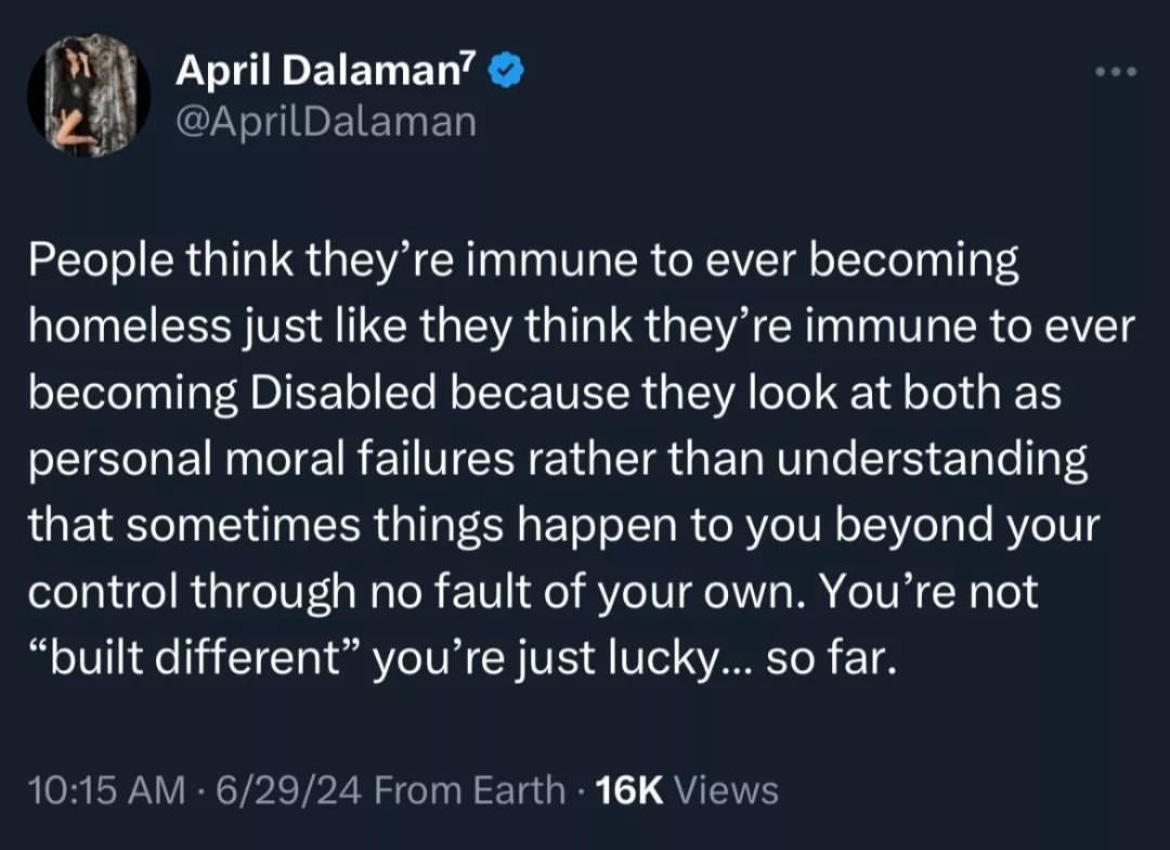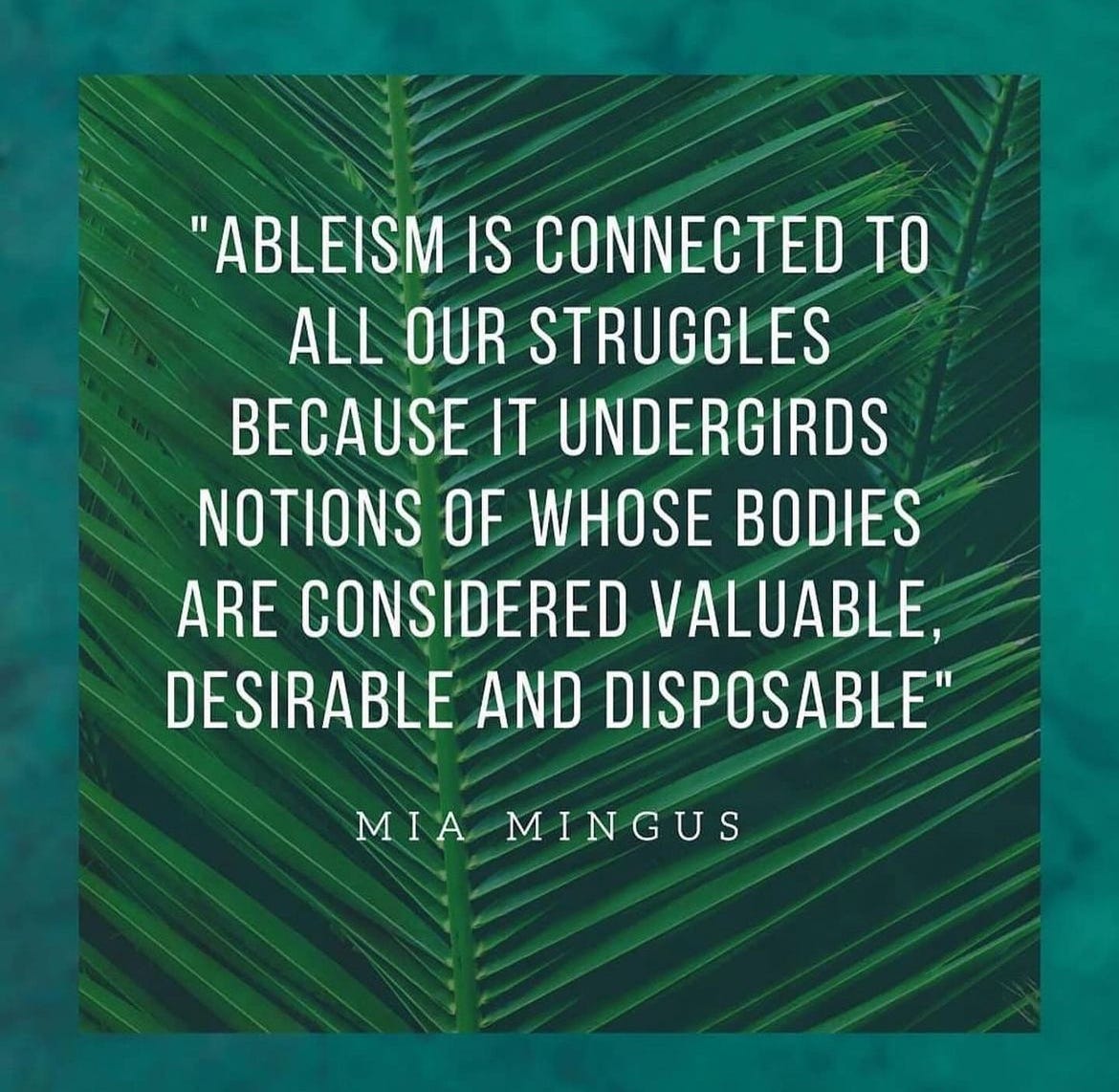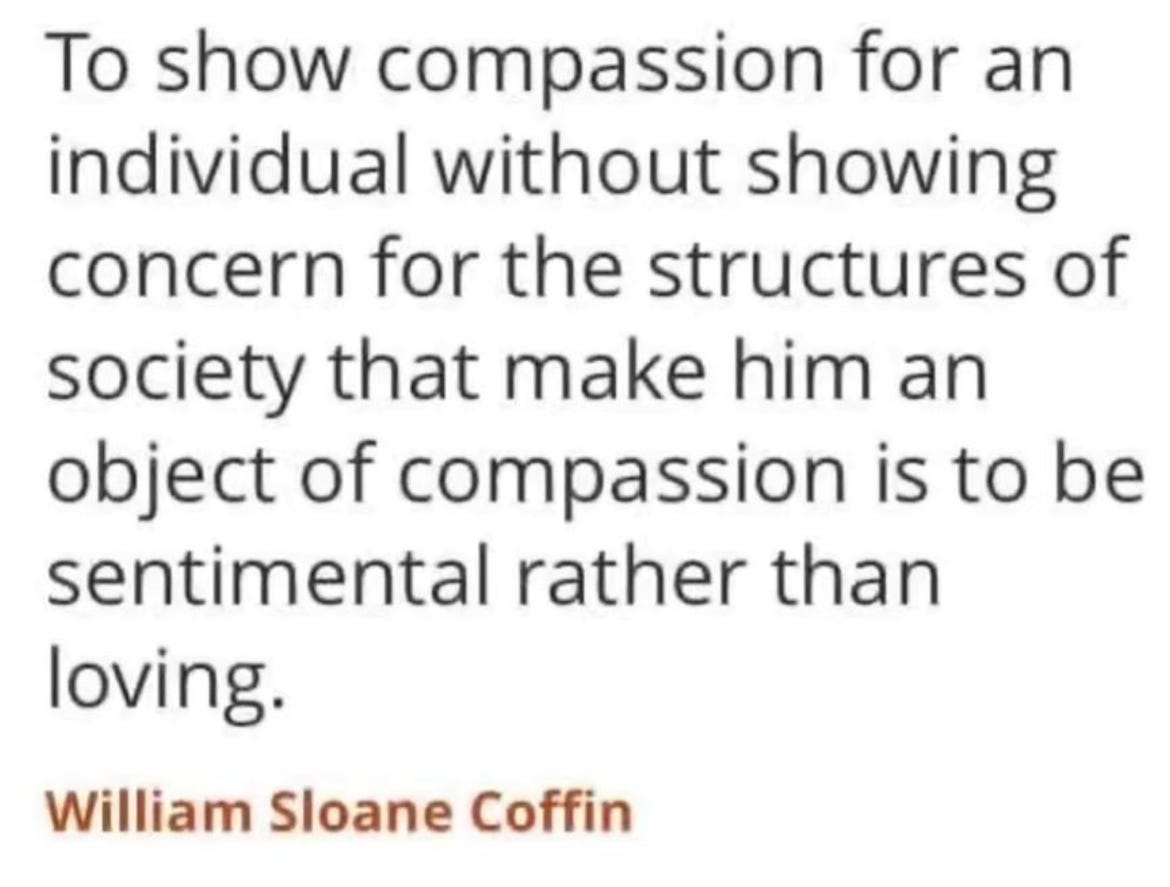My existence as a confrontation
Disabled as in, being present in my body enough to ask for what I need

CW: Mentions of bodily fluids and death
I like that Pride Month is immediately followed by Disability Pride Month. These intersections of my life ask me to be so present with myself and so unapologetic, back to back. They also require me to advocate for my livelihood and the livelihood of my communities. Every year I get more Queer; I find more about myself and dismantle more within myself to get closer to what my spirit is. In the same breath, I get more and more Disabled as well. There are new things I must adapt to as I age and witness the repercussions of not addressing what my body needed in the past.
I often suppressed so much of myself from the majority of my childhood into the majority of my 20s. I tried to fit into molds that weren’t built for me, and others tried to fit me into those molds, too. I see this now as a response to how I viewed non-Disabled people treating Disabled people. When I was little, I felt my body wasn’t mine due to constantly being “checked on” and “modified” by doctors through numerous surgeries without my consent. This then, in turn, made me feel like strangers could go up and touch my hearing aid or grab my hands to “see my four fingers.” The lack of knowing I could consent to doctors touching me rippled into my everyday life as a child and young adult, making me feel I had no bodily agency.
Family, friends, and teachers would always tell me when I was a kid and teenager that they “didn’t see me as Disabled,” which gave me not only deep personal shame for my needs that resulted in me not advocating for them but also created this unconscious action where these people didn’t get curious enough to meet my access needs. It felt like it was always about fitting into their molds instead of allowing me to create and imagine my own. I see how when folks tell me they “don’t” see me as Disabled, it’s also their refusal to put themselves into my or any other Disabled person’s shoes. It’s their refusal to acknowledge that they will more than likely be Disabled at some point in their life.

The reaction to Disabled life from some is fear; we see this fear play out with mask bans, segregating Disabled people from various spaces, eugenics, and countless other ableist tactics that work to hide/eradicate Disabled bodies. Fear also shows up in others when encountering Queer and Trans bodies as well. In listening to a recent podcast interview with Kai Cheng Thom, she tells Prentis Hemphill, “… I remind them that something else is possible…” when referring to how others view her as a Trans person. I deeply connected with this not only as someone who is Non-Binary but as someone who is Disabled, too. It’s this strange double entendre for me, though, “I remind them that something else is possible….” meaning I can express myself in any way I wish regardless of binary gender, as in “this is how you could show up” and “I remind them that something else is possible…” as in my body needs constant new accommodations due to it being Disabled, as in “this is how your body could be one day.”
My presence, to many, is a confrontation.

I wrote about this in my first newsletter, but when I visited my parents in 2020, my Mom found this journal she wrote documenting my birth and all the medical things I had navigated. Reading it was the first time I grasped how much my body navigated.
It took me a long time to create any presence in my body. When the pandemic started in 2020, and during the lockdown portion of it, it gave me some time to learn what presence in my body felt like. I stopped drinking in 2019 to help with that presence as well.
Finding the journal, not drinking, and having actual time with myself, I began building a relationship with my body. There were clues throughout my childhood of me being Non-Binary, such as the ways I never fit in with the “boys,” how I tried to reinvent my “masculinity” in college during my 20s, how I loved having my hair long to make my gender more ambiguous, or how when in elementary school a classmate told me that her stepmom had the same name as me. This time I had during lockdown to cultivate presence in my body not only taught me how to be present in my body for the sake of listening fully to it but also affirmed that I am Non-Binary.
I enjoyed taking the time to know my body. I was (and still am) meditating regularly, and it felt like all was going well. I was honoring my capacity and my need for rest, and I also started to notice when I was navigating pain to tend to myself accordingly. Gaining presence in our bodies is crucial in helping us know ourselves, and in the same breath, I started to see why I was so dissociated from being in my body for so long. Partially, that was due to my gender, and another big part of that was ignoring the actual physical pain my body was navigating. I connected pain to going to the doctor as a kid, and I didn’t like all the surgeries, so, of course, I’d not name the pain my body had. The work it took to be present in my body brought this pain up again to be named, more specifically, constant migraines.

One day in November of 2022, I was having a pretty bad migraine, which at this point was typical, so I took some time to decompress and be at home, thinking rest would be supportive, as it usually had been. I then found myself vomiting every hour on top of having this migraine. It was odd; I hadn’t experienced anything like that before in my body. As the night progressed into the morning, the vomiting persisted, and I called an ambulance to take me to the E.R. If this happened a few years before, I am not sure I would’ve even admitted myself into a hospital to get this checked on. I was extremely foggy and screaming; I was in so much pain. Pain that I hadn’t experienced, pain that my high pain tolerance knew wasn’t the usual type of pain.
My partner rushed to the E.R., and my Mom traveled several hours to see me. It was revealed I had a cyst in my brain that needed to be removed, which was causing a subdural hematoma. I had this cyst since I was ten, but doctors told my family it was benign. My body needed constant medical care as a child, so the word from doctors saying it was benign meant that this note got lost in the pile of information about my body and what needed to be tended to. In the E.R., I remember the doctor telling me there was a 50/50 chance of me losing my memory. I didn’t grasp, though, that if I hadn’t gotten that cyst removed, I wouldn’t be here writing to you now. I’ve slowly been talking about how I navigated a near-death experience, partially because I know how Disability stories can be contorted to be used as forms of “inspiration.” I don’t share this to inspire you but to say that listening to our bodies can be enlightening and deeply important. Africa Brooke said,“You can’t control how your words will be received, twisted, analyzed or criticized… To truly liberate yourself, you will NEED to risk being misunderstood.” I know I can’t control how others will view this due to the countless ways Disability stories have been used, as Stella Young puts it, “inspiration porn.”
I spent a total of three weeks in the ICU, where I ended up having to go through three brain surgeries. My Mom stayed with me, and my partner visited me daily. During my time in the ICU, I had a test copy of my “Gentle Reminders" oracle deck. I had asked my partner to bring it so we could pull cards from it. I had worked all year making this oracle deck and writing these messages. The card my partner pulled is the one featured at the top of this newsletter, an illustration of this figure with fluids going out of their head. It was strange, considering I was recovering from a “burr hole” surgery where there was a tube in my skull draining out excess fluids from the hematoma. So many of my dear friends came to see me, sent me things, and talked on the phone with me. When I was little, my surgery recoveries were always very routine; it was just me, my Mom, my Dad, and the medical staff. Here though, my Mom saw my partner and all my Queer friends show up with food and company. Recovery wasn’t easy; physically, I had to re-learn how to walk. Emotionally, I had to grasp that I almost died.
It was also difficult because some people who had been in my life previously and were used to me getting medical attention didn’t understand the gravity of how severe this was. I could see in some people’s minds that this was just “another medical thing Barry is navigating.” It’s also been challenging to see how people have reacted to me sharing this; I’ve been called “brave” when I had no choice but to endure what had happened.

It’s one thing to want to practice being present in your body, but it’s a whole other thing actually to do it. I remember always being intrigued by such mindfulness practices as a way of “enlightenment.” I naively thought that such a thing meant to bypass so much pain. I witnessed so many mindfulness “teachers” just bypassing travesties. Yes, meditation has been supportive, as has working out, ending my relationship with alcohol, and taking moments to check in with how my body is feeling. The practice of presence helped me get closer to who I am and who I desire to be. These practices, too, made the alarms in my body louder. The louder the alarms, the louder the temptations to ignore them. I see why I would avoid these alarms as a kid, considering the number of operations and doctor visits I had to navigate. I give so much grace to my younger self. The alarms, allowed me to course correct, and there’s no looking back. There’s no more ignoring; maybe because of that, there’s enlightenment. To me, enlightenment doesn’t ignore the world's pain but instead holds it for us to tend to.
Little moments of decompression can help cultivate expansion.
With it being Disability Pride month, I ground in the changes my body has been through. I refuse to be belittled by people or narratives that want to use me as inspiration while not supporting my autonomy as a human being. I refuse to hide this story, too, though, in fear that it’ll get added to the “inspiration porn” roster. The fact is, we can’t control how the system will contort our narratives. I am here to create new narratives; I am here to crumble old ideas. It’ll be a continuous practice of how I share this and all my stories.
I have pride in my Disabled body. Pride in my Disabled body enough to be unpalatable to the status quo, pride in my Disabled body enough to demand bodily autonomy, pride in my Disabled body by refusing to be tokenized, pride in my Disability to advocate for myself and others to have accessible spaces, and pride in my Disability enough to learn from my mistakes in advocating for others so that I can do better for the sake of the Disability community.




